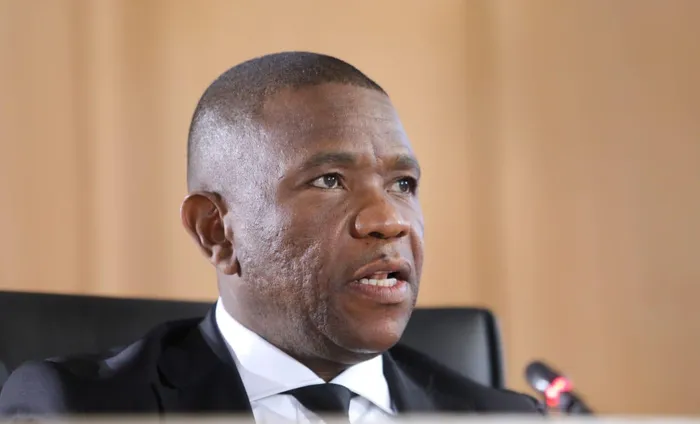Richards Bay Minerals and the Presidency face scrutiny over police unit deployment

KwaZulu-Natal Police Commissioner Lieutenant-General Nhlanhla Mkhwanazi testifying at the Madlanga Commission of Inquiry this week.
Image: Oupa Mokoena / Independent Newspapers
MINING company Richards Bay Minerals (RBM) has undertaken to come clean before the Madlanga Commission of Inquiry and answer allegations that it pressured President Cyril Ramaphosa's office to deploy elite police units for its sole benefit.
On Friday, KwaZulu-Natal Police Commissioner Lieutenant-General Nhlanhla Mkhwanazi told the judicial commission of inquiry into criminality, political interference, and corruption in the criminal justice system, chaired by retired Constitutional Court Justice Mbuyiseli Madlanga, that RBM pressured National Police Commissioner General Fannie Masemola to deploy the specialised task force and national intervention unit (NIU) to the area in the north of the province.
In response to questions on its role in the police deployment, a company spokesperson said: “RBM is committed to full transparency and will cooperate with the commission.”
The deployment followed Mkhwanazi's intervention after a series of murders of RBM executives, which remained unsolved.
Police dispatched a task team to the Richards Bay area to prevent, combat, and investigate criminality linked to the theft of minerals and murders of executives and businessmen at RBM, which describes itself as a world leader in heavy mineral sands extraction and refining, as well as South Africa’s largest mineral sands producer.
Among the murder victims is RBM human resources general manager Ronny Nzimande, who was shot and killed in September 2016 in the driveway of his home in Meerensee, Richards Bay.
Meshack Mbuyazi, who was the host community’s representative at RBM, was killed after meeting the then KwaZulu-Natal premier Sihle Zikalala in December 2019.
In May 2021, RBM operational services general manager Nico Swart was gunned down on his way to work in Meerensee.
Sifiso Mncube, divisional procurement manager at Industrial Development Corporation subsidiary Foskor, was shot dead in February last year in Meerensee while driving home after work.
Businessman Sipho Zwelethemba Masuku, who was an RBM contractor, was murdered in August last year in Meerensee in his car.
Rio Tinto, the world's second-largest mining company and owner of RBM, has previously been forced to halt its planned R6.7 billion expansion project until security issues threatening its operations were resolved, citing attacks on its employees.
In his evidence at the commission, Mkhwanazi said he sent a team of five detectives to Richards Bay, but after a year, the detectives were recalled as they had not made sufficient progress on the murder cases, but continued with their investigation cases from their normal base in Durban.
He said the detectives did normal police work but could not make any breakthroughs on the RBM-related murder cases.
Mkhwanazi said it later emerged that RBM has contacts in higher places, as he received a phone call from Masemola, who informed him he had received a complaint from the Presidency.
According to Mkhwanazi, Masemola told him that a plan must be drafted and sent to him, and he would make money available for the team.
Masemola's intervention saw the specialised task force and the NIU being deployed to Richards Bay.
Mkhwanazi testified that the task force and the NIU were the fighting arms of the police and not investigators.
He said the instruction given to the team was to work at RBM and nowhere else, and they were there for the whole financial year.
“RBM had the privilege of getting an SA Police Service (SAPS) deployment only for them, which was funded from the national office,” Mkhwanazi said.
He added that they were there for RBM and nobody else, and they were not talking to anyone, including him or the district commissioner.
Mkhwanazi described the situation as a case of the Presidency having complained, and the national commissioner deploying.
He further stated that the national RBM team was engaged in an operation that led to an Independent Police Investigative Directorate complaint against him. This complaint arose after he was accused of interfering in the January 2024 arrest of a senior Department of Correctional Services official.
The official was apprehended at Qalakabusha Prison, Empangeni, for possessing five R5 rifle rounds and 12 pills, suspected to be drugs, found in a dustbin outside her residence at the prison.
Mkhwanazi testified that he called King Cetshwayo District Commissioner Major-General Sipho Ngubane, who did not know about the operation but subsequently inquired and confirmed with him that it involved the team deployed at RBM.
He said businesspeople in that area complained about the deployment of the police's RBM-specific team, but he told them to speak to the then police minister Bheki Cele.
Mkhwanazi insisted that he was unaware of the police deployment at RBM.
National police spokesperson Brigadier Athlenda Mathe said the SAPS will not comment on matters before the Madlanga Commission.
Ramaphosa’s spokesperson, Vincent Magwenya, said the Presidency will respond to the complete evidence delivered and still to be delivered at the commission.
“We are not going to engage evidence in a piecemeal fashion. Equally, at an appropriate time, the Presidency will make its own submissions to the commission to clarify its position where necessary,” he said.
loyiso.sidimba@inl.co.za